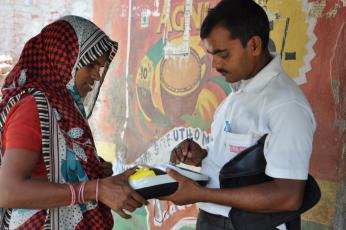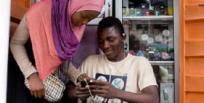
MicroSave used its Market Insights for Innovations and Design (MI4ID) approach to conduct a series of studies in different parts of India. These studies sought to understand gender aspects of agent banking. The first part of this blog series highlights key findings aimed at understanding the differences in customer experience at an agent outlet based on customer gender. This research was conducted in the rural areas of Varanasi and Unnao, located in eastern part of Uttar Pradesh (UP).
Key insights
a. Male family members are key influencers of financial decisions by women
In northern India’s rural areas, men have the key responsibility of earning a living for the household, while women are primarily expected to stay home and handle household responsibilities. Decision-making on larger expenditures in the household is collective, involving male and female adults; while smaller, household-related expenditure decisions are made by women. Women are largely financially dependent on men and are far more inclined to save than men, often putting small amounts aside from the household budget. Males’ savings accrue from the receipt of lump sums of income – from the sale of animals or crops, or from monthly salary receipts. Consequently, women will usually save small amounts frequently with the agents; whereas men tend to save less frequently, but in larger amounts.
Women customers will seek advice and approval from male and other family members prior to making any financial decision or availing a service at any agent outlet. This is not unique to the Indian market as S. Narain notes in the ‘Access to Finance’ World Bank report. In South Africa, a woman is required to obtain her husband’s signature in order to open and use a bank account. Similar biases were observed in Democratic Republic of Congo, Namibia, Rwanda, and Uganda. A number of banks in Pakistan require a husband or a male family member to co-sign a loan for a woman.
“My husband said that I should open an account at the counter, so I did” - A female customer in rural Varanasi
b. Agent behaviour differs with respect to gender of customers
Female customers should be treated well to keep agency business sustainable: A key concern for agents is the sustainability and profitability of their business. This is largely dependent on frequency and regularity of transactions. As pointed out by Women’s World Banking, agents understand that women are more likely to save and hence serving them well can increase agent commissions. Agents interviewed indicated that, given the choice, they would rather serve female customers.
According to the “Digital Financial Solutions to Advance Women’s Economic Participation” report, women face cultural, social and systemic barriers that limit demand for, and use of, digital financial services. These include lack of identification documents, low literacy levels, lower technology adoption levels, and social and cultural sanctions that limit the free movement of women. Agents opine that social norms restrict females and they will treat female customers preferentially to encourage use of financial services. MicroSave observed, in some instances, that the agent would not only offer a seat to female customers ― as opposed to a male customer waiting to be served ― but also allow the waiting female customers to ‘jump’ the queue. Female customers interviewed confirmed having received this kind of preferential treatment.
“Women visit my counter frequently to transact: this encourages me to serve them better.” - An agent in rural Unnao
It is worthwhile to note that, in India, social norms differ across geographies and these findings are limited to two districts of the most populous state of India, Uttar Pradesh. It is possible that agent behaviour may differ in another region because of different social norms.
Agents perceive women customers as more manageable. Women’s lack of familiarity with financial products and services makes them less demanding, and more agreeable. Men are more inquisitive about different financial products and services, and more insistent to have their queries resolved by agents.
c. Male customers expect to get preferential treatment from agents
In the rural geographies of India, men generally enjoy a higher social status than women, due to a variety of complex social reasons. In this social system, males expect to get preferential treatment at the agent counter, including being served before any women in the queue. Sometimes, if men are denied preferential treatment, they are irritable and dissatisfied with the agent.
“At times, male customers are hard to deal with, as they try to override the queue and also argue over petty issues, such as delay due to over-crowding or systemic delays.” - An agent in rural Varanasi
Implications for agent banking
Agent networks need to be developed and managed to accommodate existing perceptions, beliefs, and social norms. As highlighted above, in different ways, both male and female customers offer a huge potential for growth in the development of digital financial services. The Government needs to adopt and promote a financial customer protection framework to ensure that new female customers are treated fairly and have sufficient financial skills to enhance understanding (and trust) in digital financial services with a view to large-scale adoption.
For a service provider, these insights will help design financial products and services that respond to gender aspects. Digital financial services can offer women greater privacy, confidentiality, and control over their finances. According to a report by UNCDF and GPFI, giving women more financial autonomy can have a positive impact on an entire household. Agent support can motivate female customers to use financial services despite the prohibitive social norms (as discussed in the next blog: “Agency Banking: Male vs. Female Agents”). Moreover, customer service is the key to surviving in a competitive market.
The social status of rural women often limits their ability to travel beyond the confines of the village. Men have more financial autonomy and higher levels of exposure to financial products and services, as they travel out of the village more often than women. Thus, marketing and communication messages and delivery channels for products targeted at the rural female segment need to address this reality.
Now that we have looked into the gender aspects in agency banking, the next blog in this series will discuss how an agent’s gender impacts customer experience.













